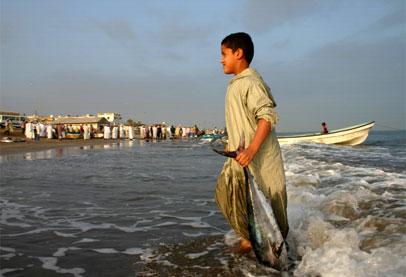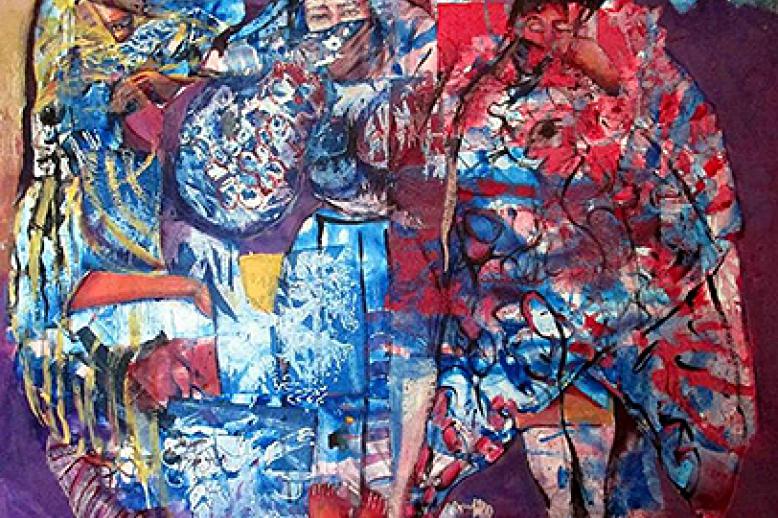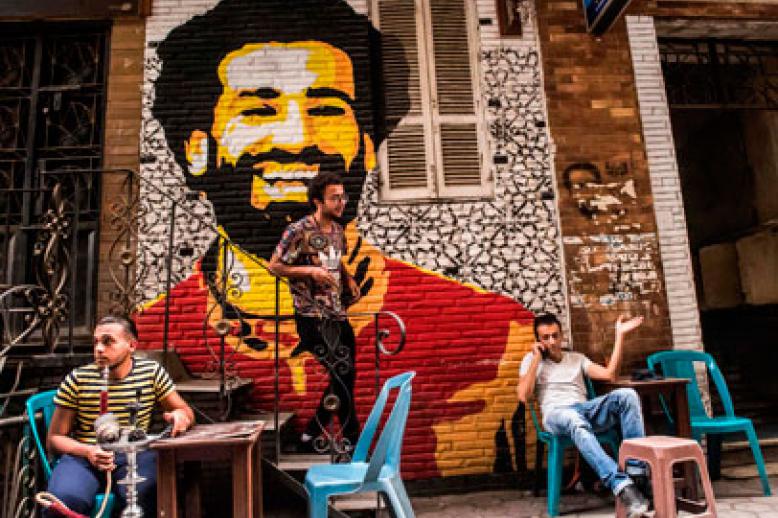Oman: a land of hospitality and harmony

Some while ago I was staying in a village in Oman. The village had some 300 inhabitants, all of whom were related. Although they met several times during the day, they still spent a long time greeting each other warmly whenever they met. I estimated that they actually used a couple of hours each day to this end.
So it is of utmost important to show each other respect. Another thing is, of course, that Arabs love to converse, and when doing so, a possible solution to problem is of secondary importance, although solving the problem was the reason for holding the conversation in the first place.
The art of conversation has a pattern as stylised as traditional embroidery and thread through a prearranged design before diverging into the exchange of news, or sometimes into discord. Archaic usage is unfailingly polite, just as the elaborate greeting is courteous by intention even if the purpose of one's visitor is known to be less than friendly.
Oman is a land of grandeur, a tapestry of contrasting scenery and colour. Towns and villages couched amidst palm trees and lush green crops provide peace to the weary traveller in the sultry heat of summer.
The mountains dominate Oman and attract a good deal of rainfall, which is channelled through a system of waterways known as the falaj - the life-line of the people. In the heart of the Hajar mountain range is the towering Green Mountain, whose plateau is fertile with gardens and orchards of fruit: a patchwork of colour protruding on terraces where villages nestle on the steep craggy slopes.
Oman is flanked by deserts and ocean but it offers an entrancing surprise. Its southern part, Dhofar, is blessed with a unique climate and resources unlikely in any other Arab country. The area is embraced by mountains which during the summer are sprinkled with the Eastern monsoon rain and shrouded in cool mists. There is rich soil to cultivate and mountain cattle graze on lush vegetation. Numerous villages dot the thousand miles of coastline. Fishing is a year-round occupation and methods follow a traditional pattern largely unchanged for centuries.
Although much of the ancient way of life is overshadowed by the modem development now taking place, Omanis are wisely preserving the nation's traditions and heritage so that they will not be lost to posterity. Family life has ties of blood and love, forever celebrated in the exchanges of greetings when Omanis meet. The formal order of enquiry after members of the family and the state of ones household masks in ritual the concern each has for the stability of the home.
The people of Oman share the characteristics of their land: they are varied, complex and outward looking. The Omanis love to boast of their membership of one Bedouin tribe or another. To belong to a famous tribe or family can give the poor, as well as the rich Arab a social status he otherwise would never have had. Arabs are quite simply snobs as far as their lines of decent are concerned.
They are proud of their family names, and as far as this is concerned it is most important when dealing with an Arab, that one makes an effort to write or pronounce his name correctly. Every Bedouin belongs to a tribe, the members of which are to some extent related since they descend from the same forefather.
The closer he is related the greater his loyalty to his kinsman, and this loyalty carries more weight than his own private interests. In times of need, a Bedouin instinctively sticks together with his kinsmen, just as they back him in a similar situation.
In Old Arabia there was no security outside the tribe. This maybe explains why Bedouins, who are otherwise extremely individualist, submitted to the collective interests of the tribe. If the worst came to the worst any man who refused to accept a decision made by the tribe could risk being excluded, and he would not have been able survive on his own.
A sheikh was the leader of the tribe, but he was only the first among equals. Although Bedouins respect the patriarch of the family, they never gave their sheikh any permanent right to rule over them. If a sheikh proved unable to do his job, another would soon take his place. A sheikh could only maintain his status by securing the tribe's interests in war and politics. In addition he would have to be aware of everyone's' problems and most important of all, he had to be generous. Meanness is still the worst attribute one can accuse a man of having in an Arab country.
Hospitality is a spiritual experience that pays no heed to venue. When an Arab greets his visitor saying "My house is your house," he's expressing the generosity traditionally due to a guest. How much or how little may be offered, it must symbolise a sacrifice of the household's comfort. If food is scarce, the guest must have all he needs before his host feels his courtesy has been acknowledged. There is a nobility in the proffering of shelter, food and graceful conversation. It is not a bid for favour or admiration, merely a traditional act of benevolence.
Wilfred Thesiger, in his classic book Arabian Sands, tells of an encounter, in the Empty Quarter with an Omani bedu family in the late 1940s: "The next morning we saw some tents, and Hamad said 'I don't know who they are,' so we bore off to the right of them to pass wide of them but a man came out from among them and ran across the sand towards us, shouting 'Stop! Stop!, As he came near, Hamad said, 'It's all right. He's Salim, old Muhammed's son.' We greeted him and he said, 'Why do You pass by my tent? Come, I will give you fat and meat'. I protested instinctively, but he silenced me by saying, 'If you do not come to my tent, I shall divorce my wife.' This was the divorce oath, which he was bound to obey if we refused. He took my camel's rein and led her towards the tents."
But such concerns are not shared by a group of men gathered one afternoon prior to an Islamic festival for a picnic in the heights above Salalah, an old tradition. They sit on rugs and chat, making fun and drinking - mineral water. After a clear day the sky is now overcast and the first fog descended on the fields and gnarled trees. Over a small fire sizzle pieces of meat, emanating a delightful aroma.
As darkness falls, a man picks up a lute and begins to play. And of course he sings about Oman. Of its glorious past, when Omanis sailed to Zanzibar and China, of the country's beauty, the desert, the mountains and the sea and of the courage of the people who fought off all invasions. They sing 'Allah Karim,' 'God is bountiful.' Everybody claps along, keeping time while someone dance a parody of a sword dance, using sticks for swords. Suddenly they are silent.
The men form lines and begin to pray evening prayer, the Muslims' fourth of five daily prayers. Afterwards the picnic continues with unabated energy until well into the night. At last they roll up into their rugs to sleep out in the open. And suddenly the Omanis are living as they always used to: without air conditioning, TV and other mod cons. Only the crackling of the fires and the melancholy tone of the lute can be heard, getting lost in the fog.
Dr. Hussein Shehadeh is a writer and lecturer on Arab culture and society in the Scandinavian countries. Shehadeh has lived and worked in Denmark for more than 50 years and visited the Sultanate on various media assignments during that period.




